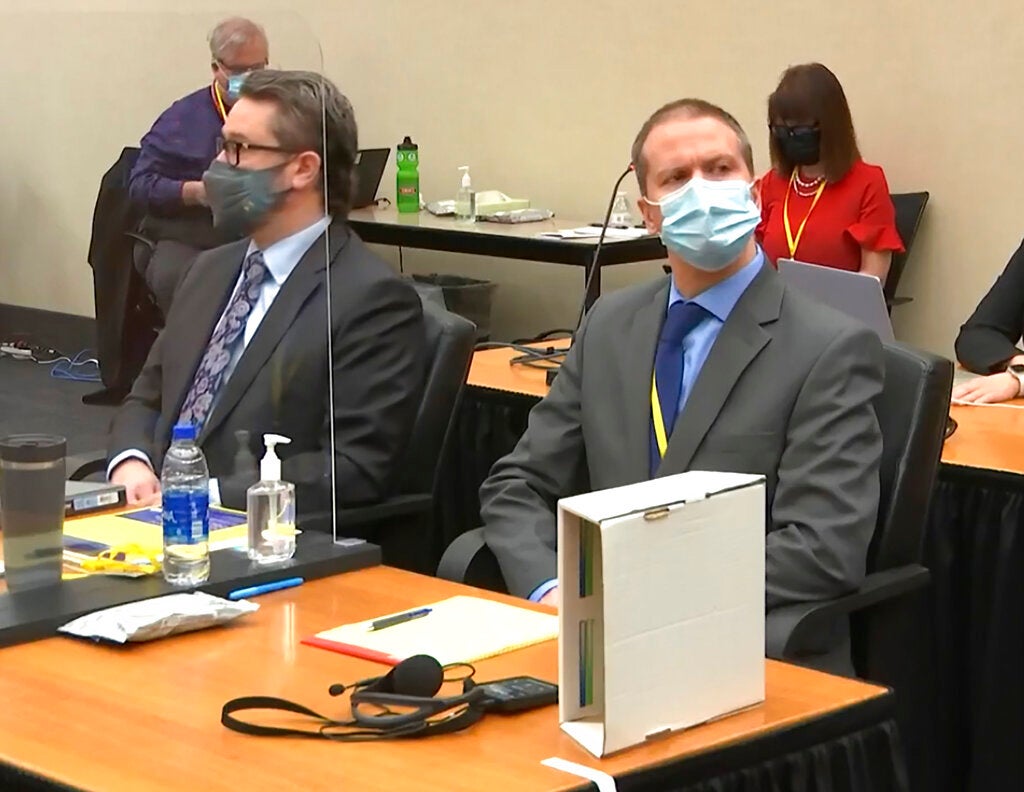In opening statements in the trial of former Minneapolis cop Derek Chauvin for the death of George Floyd, prosecutors took pains to explain the full horror of the officer’s subjugation of the Black man last summer by placing his knee on his neck.
Suggested Reading
“The most important numbers you will hear in this trial are nine two nine,” prosecutor Jerry Blackwell told the jury in Hennepin County courthouse on Monday, reports KSTP News. Blackwell said Chauvin pinned Floyd to the ground for nine minutes and 29 seconds, longer than the nearly eight minutes the harrowing hold was previously believed to have lasted.
Blackwell then played the infamous video footage of Chauvin kneeling on Floyd’s neck as the 46-year-old man cried out in pain and bystanders at the scene spoke out against the cop’s actions. These bystanders included an off-duty fire department employee who told Chauvin to check Floyd’s pulse, and who the prosecutor said Chauvin ultimately turned his mace on to keep away.
Chauvin “didn’t let up” on Floyd, said Blackwell. “He put his knees upon his neck and his back, grinding and crushing him, until the very breath—no, ladies and gentlemen—until the very life was squeezed out of him,” he added, according to the Associated Press.
In his opening statement, Chauvin’s defense attorney Eric Nelson put forward the argument that Floyd’s death was caused by everything but the former cop’s knee on his neck for nearly 10 minutes. Chauvin instead referenced the complaints from the horrified crowd and a history of reported drug use by the 46-year old as contributing factors to Floyd’s death.
From AP News:
Floyd was fighting efforts to put him in a squad car as the crowd of onlookers around Chauvin and his fellow officers grew and became increasingly hostile, Nelson said.
The defense attorney also disputed that Chauvin was to blame for Floyd’s death.
Floyd, 46, had none of the telltale signs of asphyxiation and he had fentanyl and methamphetamine in his system, Nelson said. He said Floyd’s drug use, combined with his heart disease, high blood pressure and the adrenaline flowing through his body, caused a heart rhythm disturbance that killed him.
“There is no political or social cause in this courtroom,” Nelson said. “But the evidence is far greater than 9 minutes and 29 seconds.”
Nelson added that in the deadly incident, Chauvin did exactly what he was trained to do as a police officer.
Meanwhile, the first witnesses who took the stand in the case made it clear that Chauvin’s actions were patently disturbing to them as they watched, to the point where three of them called the police on the police officer during the incident.
Jena Scurry, a 911 dispatcher, testified that she called a Minneapolis police sergeant after seeing on a city surveillance video how long Chauvin was restraining Floyd. According to the New York Times, Scurry started off that concerned call to the sergeant by saying, “You can call me a snitch if you want to,” but couldn’t discount her gut feeling that something was wrong.
Donald Williams, a former wrestler and witness who was on the scene, spoke from the stand about his ultimately accurate concern that Chauvin’s treatment of Floyd would be fatal.
From ABC News:
Floyd “was speaking in a distressed way” when Williams got there, vocalizing to the officers that he was in pain and that he wanted his mom, Williams said.
“His breathing was getting tremendously heavy,” Williams said, adding that it was apparent that he was struggling to gasp for air.
At one point, Floyd’s eyes then “slowly rolled to the back of his head” and his nose started bleeding, and soon after he was “lifeless,” Williams said.
WIlliams, who is trained in martial arts, testified to his belief that Chauvin was aware of the fatal consequences of what he described as a “blood” chokehold that the then-cop kept on Floyd.
“It’s the only time he looked at me, when I said it was a blood choke,” said Williams, according to MPR News. “We looked at each other dead in our eyes. When I said it, he acknowledged it.”
Chauvin’s trial, on charges of second-degree murder, third-degree murder and second-degree manslaughter continues Tuesday—commencing at 10:30 a.m. ET—and is expected to run for the next four weeks. You can watch the proceedings on most major news television channels as well as on Court TV, including through livestream on its website. You can also follow along on NBC News’ livestream here:
Straight From 
Sign up for our free daily newsletter.



